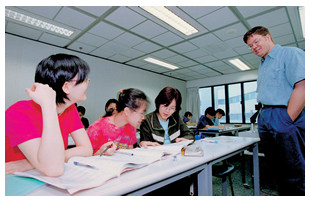OD curriculum opens room for new experience
Out-of-discipline (OD) courses are gaining more attention from faculties as a venue to fill educational needs currently not met in mainstream core curriculum. Rather than offering piecemeal OD courses, as in the past, some academic departments at City University have taken the proactive steps of consolidating resources on OD curriculum development, setting up committees and designating staff members to design tailored courses, and vigorously promoting OD courses to attract student enrolment. They see vast potential in OD courses for creativity, diversity and cross-disciplinary stimulation.
The credit unit system at CityU stipulates that undergraduate students should take a certain number of "out-of-discipline" courses outside their specialist areas, in order to widen their learning experience. Bachelor degree students are required to complete at least nine credit units of OD, while sub-degree students are expected to take no less than six credit units. OD courses, open to all disciplines and all levels of undergraduate students, degree or sub-degree, thus become a unique learning and teaching experience on campus.
"We want to make the provision of OD courses one of our important missions, making sure they are of the same quality as our core discipline," said Professor Anthony Cheung, Chairman of the OD Course Committee in the Department of Public and Social Administration (SA). The committee reorganized OD curriculum in the department, giving it a sharper focus as well as a more appealing package. With the addition of 14 newly designed courses since the package was consolidated two years ago, there are as many as 20 OD courses available this semester, organized under the following themes: "Fundamental studies", "Understanding Nations and Societies", "Hong Kong", and, "Creative Thinking and Practical Wisdom". Total enrolment figures in the department's OD courses have risen 62%, from 291 (Semester A, 2001/02) to the current 473 (Semester B, 2002/03), since the curriculum was repackaged. "We want to see what is there in our department that is relevant to students across all the disciplines in the University; and then package it in a student-friendly way," Professor Cheung said.
Another academic unit that has taken the initiative to shape up its OD curriculum is the Department of English and Communication (EN). Some 17 courses are currently available in the Department's OD package, categorized under the four themes of "Communication", "Cultural Studies", "Literature" and "Euro Languages". Most items on the clusters of "Euro Languages" and "Culture Studies" are new courses introduced over the past three years. Five part-time instructors have been hired to staff the two new clusters and total enrolment figures in the department's OD courses has shot up from 274 (Semester A, 1999/2000) to the current 551 (Semester B, 2002/03).
"OD courses help to provide a well-rounded educational experience. We are taking a more systematic approach to their development because we find that they have good potential for diversity, creativity and recognition, apart from the practical consideration of getting more revenue," said Dr John Erni, OD Course Coordinator for EN. "Sometimes we come up with new ideas that could not be easily put into practice in our core programme, so we can try them in the OD curriculum, which is more flexible in opening room for new experiences." Since he took over the role of OD coordinator, Dr Enri has introduced as many as eight courses in the cultural studies cluster.
Mass appeal and intellectual weight
Striking a balance between popularity and intellectual vigour is always an important consideration in designing OD courses. While past enrolment figures count, academic weight is not overlooked. "Organizing the OD package, I always ask the question, 'intellectually, is it important for the University to have such a course?' ", Dr Erni explained.
In the EN out-of -discipline curriculum, there is a mix of practical and intellectual subjects. European languages, such as Spanish, Italian, French and German, and communication subjects on effective presentation, and the Internet, which address practical needs on employment and travel, prove to be favorites among students, registering an enrolment between 50 to 80 in one semester. As for the literature and culture study courses, which attract a much smaller audience, they are still considered essential elements making the curriculum comprehensive. "I insist that we should have some literature courses in OD, to complement what we already have in our core programme requirement. As for cultural studies, they are the ideal non-core courses to be experimented with on the OD platform. They are becoming more popular with the students, too."
"While we want to make OD courses student-friendly, we do not want them to become trivial, we want to make sure that they add value to our students," said Professor Cheung, "That's why one of the important functions of the OD Course Committee is to validate proposals for new courses." SA's OD curriculum, developed under the central theme of "exploring new worlds of ideas", is geared towards stimulating students to think in new ways about the world in which they live.
Whether it is Contemporary China under the "Understanding Nations and Society" series, Politics and the Media in Hong Kong under the "Hong Kong" series, or Logical Reasoning under the "Creative Thinking and Practical Wisdom" series, the emphasis is always on enhancing students' power of understanding and critical thinking. Contrary to the popular notion that students respond enthusiastically only to courses which address their practical concerns, some of the most popular OD courses in SA seem rather to appeal to the abstract and the intellect, for instance, Critical and Creative Thinking and Introduction to Philosophy, hitting an enrolment of 175 and 66, respectively this semester.
Cross disciplinary stimulation
Open to students of all levels and all disciplines, OD courses provide a unique opportunity for cross-disciplinary stimulation. There is no assumption on prior knowledge on the part of the students. Course material has to be structured on an introductory level. Lively presentation of course material that goes beyond lectures is emphasized. Stress of examinations is kept the minimum. Assessment and grades are mainly based on class work and group presentation. The emphasis is always on inspiring interest and widening horizons, rather than on providing in-depth knowledge.
"Teaching OD classes, we get the opportunity to meet students from other disciplines. It is so encouraging having so many, say engineering majors, show interest in cultural studies. Sometimes they bring in fresh perspectives from their different major background, which always interests me," said Dr Erni.Teaching a class of students with diverse academic backgrounds and levels, one has to be prepared to adapt and adjust as the course goes along, and not be stuck with a predetermined teaching plan. From Dr Erni's experience, teaching an OD course on Globalization and Culture, which happens to have a heavy number of business majors, has meant he has brushed up on his knowledge in business in order to get better connected with his students. "In this way, the teacher is also learning, which is just the fun and the challenge of teaching OD."
"For teachers, it is rewarding to see students register in your course though it is not strictly required," said Professor Cheung, who was gratified to see that his OD class Politics and the Media in Hong Kong has been steadily growing in numbers. Teachers also need to learn to be open-minded and put effort into integrating core with non-core students, he remarked. "It is a unique chance to connect with students from other disciplines, and seeing how students respond on a cross-disciplinary level, one gets more stimulation.

